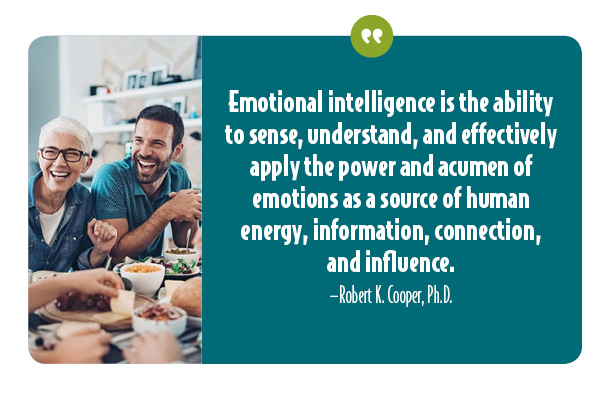Emotional intelligence (or EQ) is a term that has been floating around for decades. You've no doubt heard about it, but why should you care? Learning and practicing emotional intelligence can feel like climbing Mount Everest, difficult—even unattainable. Maybe that's why emotional fitness is still not as popular as physical fitness. After all, how often do you hear someone saying they're working out at an EQ gym every day? ...Never!
Estimated reading time: 7 minutes
 Why Is Emotional Intelligence Important?
Why Is Emotional Intelligence Important?
Emotional intelligence skills are vital and well worth the effort to learn. Some say EQ is even more important than IQ. Good emotional health is as essential as physical health because once EQ skills are learned, they make an incredible impact on our lives and relationships, heightening inner peace and making conflict a fun adventure. Hmm, this feat might seem impossible, but it's nonetheless true.
Think about it for a moment. You’d probably agree that the quality of life is dramatically reduced without physical and mental health. Well, let’s look at emotional health.
Most everyone knows someone who struggles with anxiety or depression. It can be rough just making it through each day.
Or have you ever been taken off guard by a person lashing out at you in anger? Yup, that’s a person unable to regulate their feelings. Maybe anger is a challenge for you or your partner. If it is, you’ll want to keep reading.
Related reading: "What Is Emotional Intelligence?"
How a Lack of Emotional Intelligence Affects Relationships
Or maybe you’re in a relationship with a people-pleaser. You’re baffled by their resentment about decisions they agreed to earlier—or so you thought! Yup, here’s a person who seeks the safety of compliance through avoiding conflict. It just so happens that speaking our truth and setting healthy boundaries are emotional intelligence skills, too.
Or perhaps you have a co-worker at work who gossips about other employees or bugs you incessantly with unnecessary questions. Yup, a person who lacks self-awareness and the ability to self-regulate.
Don't these emotional expressions affect the quality of your life and relationships?
Emotions, emotional awareness, emotional regulation, emotional management, and emotional expression are how we interact with and experience life and relationships with others. What could be more worth investing in!?
 What Does Emotional Intelligence Mean?
What Does Emotional Intelligence Mean?
Let's explore what emotional intelligence means, how it affects our mental health, and how to improve EQ in everyday life. You’ll discover why it's worth applying yourself to improve your emotional intelligence.
Another way to understand emotional intelligence is through being emotionally fit. Just like we exercise or lift weights to strengthen and tone muscles, we can also gain emotional fitness.
We can improve our ability to identify, assess, and manage our own emotions through practice. Emotional intelligence enables us to self-regulate, quell anxiety, and prevent angry or knee-jerk reactions that can harm relationships. It helps us express empathy for others and have greater social awareness to create genuine connections in every area of life.
When we have emotional intelligence, we build self-mastery, refrain from impulsive choices, advocate for our needs, and communicate effectively with diverse people. Emotional intelligence in the workplace can help you excel, and in your personal life, it will make for far better relationships. 
How to Improve Emotional Intelligence
Learning to be self-aware and access our emotions more doesn't mean we always feel everything deeply or become overly emotional. Emotional management gives us the ability to think before reacting. It helps us focus on what's most important to us in different situations. EQ proficiency is helpful in all areas of our lives. But when it comes to relationships, emotional intelligence creates ease, equity, and a more meaningful connection.
Getting to Know Emotional Fitness Basics
Although there are dozens of EQ skill sets, it's easiest to break emotional intelligence down into four primary areas. And it's worth noting that it's also useful to focus on self-awareness first because it supports the development of the other areas.
Just as physical fitness encompasses a broad range of knowledge, skills, and abilities (flexibility, cardio exercise, safe weight lifting, etc.), emotional intelligence involves several skill sets that work together to create emotional well-being.
There are different ways to divide the EQ skills, but here are four primary areas of emotional intelligence:
Self-Awareness
Being able to notice and identify your emotions and their impact on you. Emotional literacy is the first step in mastery. Suppose we don't know what we're feeling and why or how to distinguish between conflicting emotions and intensities. In that case, it's challenging to have emotional experiences that are meaningful or to gain effective emotional regulation. We cannot change what we are not aware of.
Deep Dive: "What Is Self-Awareness? And Why Is It Important?"

Self-Management
The ability to balance emotional self-control with expressing your emotions appropriately. Emotional management is about emotional regulation, which includes keeping our emotions in check, responding thoughtfully, and effectively managing our behavior in varying relationships.
It's a lot like learning to ride a bike; it takes balance, focus, steering, self-control, and pedaling. Self-management is a combination of multiple actions that work together for a desired goal or direction.
Managing ourselves also means making healthy choices, being honest even when it's hard, internally motivating ourselves to act on what is important to us, caring for our and others' safety, and taking actions to be at our best.
 Social Awareness
Social Awareness
Being aware of other people's emotional states, their needs and wants, as well as how they are reacting to you and others around them. It involves reading body language and social cues from a person or group. Empathy has its roots in the ability to be aware of others. It is harder to respond appropriately or lovingly without the awareness of others.
Relationship Management
The ability to manage our relationships effectively with family members, friends, co-workers, bosses, colleagues, and acquaintances. This area includes navigating difficult conversations, repairing a breach of trust, empathizing with others, and resolving conflict compassionately and calmly. Emotionally intelligent people know how to respond with social skills that enhance every interaction instead of reacting in ways that undermine relationships.
How to Apply Emotional Intelligence and Hone Your Skills
Increasing emotional intelligence means understanding our core feelings and decoding their message to care for ourselves. For instance, if we're feeling hurt by something our spouse or friend said to us, perhaps we need to let them know. If we're sad about a friend moving away, we may need to support ourselves better, accept the change, and make plans to visit or Facetime our friend to keep the friendship robust. Building emotional intelligence and our emotional quotient requires intentional practice. As we begin to better manage emotions, our sense of well-being and personal life improve. Even when we experience intense emotions, our self-awareness allows us to self-regulate and handle ourselves better.
Building emotional intelligence and our emotional quotient requires intentional practice. As we begin to better manage emotions, our sense of well-being and personal life improve. Even when we experience intense emotions, our self-awareness allows us to self-regulate and handle ourselves better.
Three crucial abilities needed to develop emotional fitness:
- awareness of our body and what's going on inside it
- identifying and naming our feelings; responding intelligently
- understanding our emotional state and how it might affect others
When we can do all three of these things, it empowers us to take better care of ourselves. We're able to notice when we need a break or get overwhelmed and stressed and what might be triggering our emotional reactions. Practice being in tune with yourself.
Discovery Questions to Gain Self-Awareness
To improve emotional intelligence, start by working on your self-awareness and emotional awareness by paying attention to your body.
- What's happening inside you that leads to emotional reactions?
- Is there tension in your body? Your stomach? Neck or shoulders? Consciously relax any stress in your body as you inhale and exhale slowly.
- Ask yourself, "What am I feeling that my body may be showing me?"
- Are your feelings signaling you to take action to feel better?
Once we are aware, it’s time to gain better self-management. Move to be more mindful in your responses. When tempted to react, use self-control, self-calm, and think before acting rashly.
These small shifts create emotional clarity, allowing us to choose how to behave rather than our emotions hijacking our behavior.
Lastly, being aware of our emotional state and how it might affect the people around us allows us to care for ourselves and set healthy boundaries for others when necessary. Be discerning—don't let yourself get hooked on unnecessary drama.
Emotional intelligence can be learned, practiced, and mastered. Be patient with yourself and keep growing. The more you practice, the better you'll get.
If you’re ready to dig in and have a guide to learn critical skills, check out our popular downloadable course to support you in mastering the above emotional intelligence skills.
To learn greater emotional intelligence and get customized support, emotional fitness is one of our specialties. Email us at support@heartmanity.com.
And if you enjoyed this blog, don't miss out on the latest!
Sign up for our newsletter.










